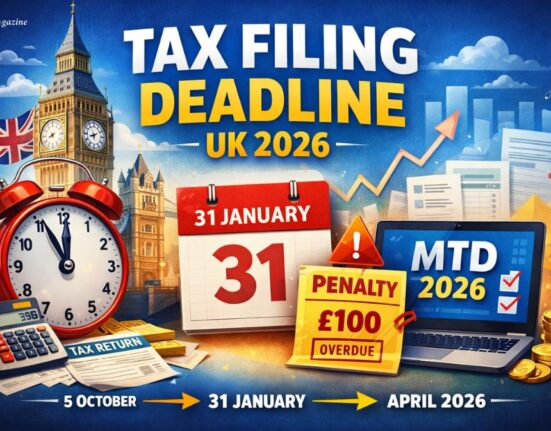So, you’ve sold something — maybe a flat, some shares, or even a bit of crypto — and made a tidy profit. Feels great… until someone casually asks, “Have you thought about the Capital Gains Tax on that?” Suddenly, the glow of your win fades, and you wonder how much of it HMRC will take.
Don’t panic. Capital Gains Tax (CGT) sounds scarier than it is. It’s the government’s way of taxing profits when you sell something valuable. And here’s the good news: you don’t pay tax on the whole amount you sold the asset for — only on the profit you made.
Let’s break it all down in plain English.
What Exactly Is Capital Gains Tax?
Think of CGT as a tax on profit. It’s the difference between what you paid for something and what you sold it for.
- Buy a flat in Manchester for £180,000, sell for £250,000 → profit = £70,000.
- Invest £5,000 in shares, sell for £12,000 → profit = £7,000.
- Buy 2 Bitcoin at £20,000 each, sell for £35,000 each → profit = £30,000.
That’s the part HMRC cares about: the gain.
The good news? Not everything is taxed. Your main home is usually exempt (thanks to Private Residence Relief), and gifts or transfers between spouses/civil partners don’t trigger CGT either.
How Much Is Capital Gains Tax in 2025/26?
The rate you pay depends on two things:
- Your income tax band (basic, higher, or additional rate).
- The type of asset you’re selling.
Here are the 2025/26 rates:
| Asset | Basic Rate Taxpayer | Higher/Additional Rate |
| Residential property (not your main home) | 18% | 24% |
| Other assets (shares, crypto, art, business assets) | 10% | 20% |
Examples:
- Sell shares and make a £10,000 gain → if you’re a basic rate taxpayer, you owe £1,000 (10%).
- Sell a second home with the same £10,000 gain → you owe £1,800 (18%).
- If you’re in the higher-rate band → the bill is £2,000 on shares or £2,400 on property.
So two people making the same profit can pay very different tax bills.
Your Tax-Free Allowance
Before you start worrying, here’s a relief: everyone gets a small tax-free allowance each year. For 2025/26:
- £3,000 per person
- £1,500 for most trusts
If your gains are under that, you pay nothing.
Example:
- Make £2,500 profit on shares → no tax, you’re under the limit.
- Make £5,000 profit on art → only £2,000 is taxable, since the first £3,000 is covered.
And here’s a smart move: couples can transfer assets between them before selling, effectively doubling the allowance to £6,000.
How HMRC Works It Out (Step by Step)
Here’s how CGT is actually calculated:
- Work out your gain → selling price minus buying price.
- Deduct costs → estate agent fees, stamp duty, solicitors, even improvement costs.
- Apply the allowance → subtract £3,000.
- Factor in your income → check whether you fall in the basic or higher band.
- Apply the rate → 10%, 18%, 20%, or 24%.
Example:
- Bought a flat (not your home) for £200,000.
- Sold in 2025 for £260,000.
- Profit = £60,000.
- Minus £5,000 costs → £55,000.
- Knock off £3,000 allowance → £52,000 taxable.
- If you’re a higher-rate taxpayer → 24% of £52,000 = £12,480 tax bill.
That’s exactly how HMRC sees it.
Reliefs That Can Save You a Fortune
Not all gains are treated equally. Some reliefs could wipe your bill down to almost nothing:
- Private Residence Relief → Your main home is usually exempt.
- Business Asset Disposal Relief (Entrepreneurs’ Relief) → Pay just 10% CGT on qualifying business sales (up to £1m).
- Spouse/Civil Partner Transfers → Tax-free at the point of transfer.
- Gift Hold-Over Relief → Lets you delay CGT on certain business assets.
These reliefs can make the difference between paying tens of thousands or paying nothing at all.
Different Assets, Different Rules
Property
- Main home? Usually safe from CGT.
- Second homes, buy-to-lets, holiday cottages? Taxed.
- Must report and pay within 60 days of sale.
Shares & Investments
- Shares outside an ISA or pension are taxable.
- ISAs and pensions? Completely tax-free.
- You can subtract broker fees.
Crypto
- Treated like property, not money.
- Selling, swapping, or even spending crypto can trigger CGT.
- Taxed the same way as shares.
Business Assets
- Selling all or part of a business may trigger CGT.
- But reliefs (like Business Asset Disposal Relief) often apply.
How and When to Report
Unlike income tax, CGT isn’t deducted automatically — it’s on you to report it.
- Property sales → report and pay within 60 days through HMRC’s CGT property service.
- Other assets → report via your Self-Assessment Tax Return by 31 January following the tax year.
- HMRC even has a free CGT calculator to help you estimate the bill.
- Miss the deadline? Expect penalties and interest.
Smart Ways to Reduce Your Bill
Nobody likes paying more tax than they need to. Here are some legal ways to cut your CGT:
- Use your allowance → spread disposals across years.
- Transfer to a spouse → double the allowances and use both tax bands.
- Offset losses → declare capital losses to reduce future gains.
- Time your sales → before/after 6 April can change the tax year.
- Use ISAs & pensions → completely shield gains inside these wrappers.
- Seek advice → for big disposals (like a business), an accountant can save you serious money.
FAQs
Q: How much is Capital Gains Tax in the UK?
Capital Gains Tax rates range from 10% to 24%, depending on your income bracket and whether the asset is residential property, crypto, or shares.
Q: Do I pay Capital Gains Tax on all profits?
No. You only pay CGT on profits that exceed the £3,000 annual tax-free allowance (2025/26). Anything below this threshold is exempt.
Q: How much CGT do I pay on a second home?
If you’re a basic-rate taxpayer, CGT is 18%. For higher or additional rate taxpayers, the rate increases to 24% on residential property sales.
Q: Is cryptocurrency subject to CGT in the UK?
Yes. HMRC treats crypto assets like shares, meaning profits from buying and selling coins are taxable under CGT rules.
Q: Do I pay Capital Gains Tax on my main home?
Usually not. Thanks to Private Residence Relief, most people selling their primary residence are exempt from CGT.
Q: What happens if I don’t report Capital Gains Tax?
Failure to report gains can result in penalties, interest charges, and investigations from HMRC. Staying compliant avoids costly mistakes.
Q: Are gifts to family members taxable under CGT?
Yes, gifts can trigger CGT, except when transferred to a spouse, civil partner, or where special reliefs apply.
Final Verdict
Capital Gains Tax in the UK isn’t a one-size-fits-all rule. It changes depending on what you’re selling, the profit you’ve made, and your overall income level. For some, it might just mean a small bill on shares, while for others — like someone selling a second home in London — it can easily run into tens of thousands of pounds. The real difference comes from knowing the rules, making smart use of reliefs, and planning before you sell. And when the gain is large, especially on property, crypto, or a business, getting professional advice is almost always worth it.
Visit: Pure Magazine








